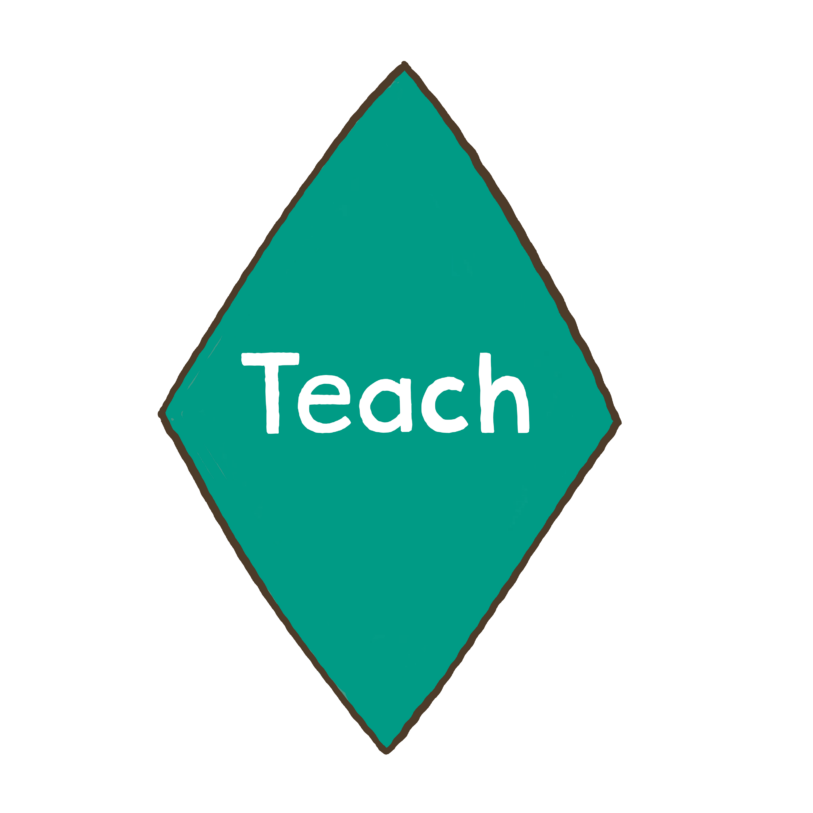
Teach
Favorite Teacher
A Starring Role
You have the leading role in the stories your child sees unfolding each day. Play to your audience. Notice what makes them laugh or cry. Pay attention to the things they dread and the things they run towards. Then give them more of the things that light them up. Do they like it when you make silly faces? Make silly faces. Do they enjoy it when you whisper in their ear? Whisper secrets to them. You hold the power in the relationship. It's a big responsibility, but so is raising a child. Make the most of your role.
Becoming your child's favorite teacher.
Teachers will come and go in your child's life. But you are a constant. Becoming your child's favorite teacher will benefit you both in the long run. Unfortunately, there will be teachers your child doesn't connect with along the way. When that happens, you'll be there to advocate for them and to teach them what to do. To let them know that there's something to learn from everyone we meet. That learning what makes us unhappy or uncomfortable or unsafe is important. Knowing these things about ourselves help us make better decisions. We can decide to change things or avoid them. Be brave or seek refuge. They need a person to turn to, to trust. Be that person.
Life Lessons...
Know Your Audience
The best teachers connect with their students BEFORE they try to teach them anything. They ask questions in order to find common ground. They assess their student's needs so they can meet those needs. These teachers also share their own stories and ideas. Teachers who don't take the time to build a connection with students aren't as effective. No one wants to learn from someone they don't know, like, or trust. And for good reason.
Here's where you have the advantage over every teacher your child will encounter. You know your audience. You are part of their past, present, and future.
Be Consistent
Good teachers are consistent. Children like to know what to expect. A teacher who's friendly to a student one day and impatient with them the next has a tough road ahead. A child is more likely to learn from the teacher who is consistently encouraging and creates routines. Ten minutes of reading or teaching at the same time each day is better than reading for an hour on random days. Build routines (read our post about Reading Rituals) so your child knows what to expect.
Be Flexible
Experienced teachers know that teaching doesn't always go according to plan. Students get confused. Or lose interest. A fire drill sounds, or the students notice snow is falling outside. These are all teachable moments. Students are watching to see how their teacher reacts. If a teacher panics during a fire drill, students will think there's something to panic about. If a teacher expresses excitement about the falling snow, students will know it's ok to show their excitement. Expect the unexpected.
Be Patient
Short and sweet lessons are more effective than long and boring ones. Keep your child's age and shorter attention span in mind when you're trying to teach them something. If their eyes start wandering or they glaze over you've either lost their interest or you never had it to begin with. If you can't find a way to engage them, it's best to move on. Patience pays off.
Be Open
The best teachers are learners. They one thing they know for a certainty is that they have a lot to learn. This open-mindedness and willingness to learn is what makes them excellent role models for their students. Lifelong learning is what motivates us to grow and adapt. Effective teachers send their students these clear messages- we learn from each other and each person's perspective is unique.
Be Present
Life is busy, and we constantly pulled in many different directions. You can easily get distracted while you're teaching your child. Your phone lights up with a new message. You're thinking about the difficult email you have to write, or a fire you have to put out at work. The laundry has piled up again, and the dog is whining to go out.
Distractions happen. But it's important not to let distractions take priority over your child. If you want their full attention, you need to model being present for them. Silence your phone for fifteen minutes. Let the dog out before reading time. Put that email on the back burner for now. Your child is waiting for you. Let them distract you from the rest of your life.
 A LitSteps approach to teaching:
A LitSteps approach to teaching:
Opportunities to teach literacy are everywhere. You only need to know what you're looking at.
Books- "You are an expert at turning to the correct page."
Music- I made a special trip to the library and chose books about dinosaurs and soccer. I know how much you love learning about those things.
Play- I saw this unicorn bookmark at the store and thought of you. I bought it for you to use during our reading time.
Daily Activities- I can't wait for our reading time to start. Whoever gets to the reading nook first gets to choose the book!
Out and About- Reading time is an ideal time to snuggle with your child. Just try to stay awake until the end of the story.


